COEN COUNTRY: From the Second Chair to the Electric Chair. The Barber's American Odyssey. The Man Who Wasn't There.
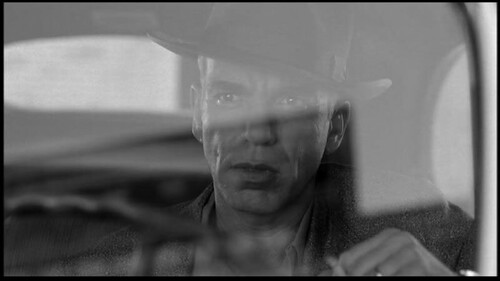
"What kind of man are you?"
Many a review regarding their most recent film, the effectively affecting No Country For Old Men, has emphasized the flawlessness with which the Coen Brothers have translated Cormac McCarthy's novel from the page to the screen. Whole sections of dialogue have been lifted verbatim from the acclaimed book. The pacing and chain of events in the film are nearly identical to those in the book. Yet the whole film manages to filter its way through the Coen's eerily singular vision, ending up not just a meticulously respectful recreation, but also a well-worn, completely familiar experience. If No Country is one of the greatest book-to-film adaptations of all time then I argue that 02001's The Man Who Wasn't There (if not my absolute favorite of their films, definitely a member of the mile-high club with Barton Fink and The Big Lebowski) is the inverse. Namely, in the completely original screenplay of a reticent, retiring barber and the severe choices he makes, the Coens have not just written the Great American Pulp Novel; they've cast, produced, and directed it too.
 The Man Who Wasn't There feels much more at home as a last minute addition to Ethan Coen's enjoyable pulp pastiche, the short story collection Gates of Eden
The Man Who Wasn't There feels much more at home as a last minute addition to Ethan Coen's enjoyable pulp pastiche, the short story collection Gates of Eden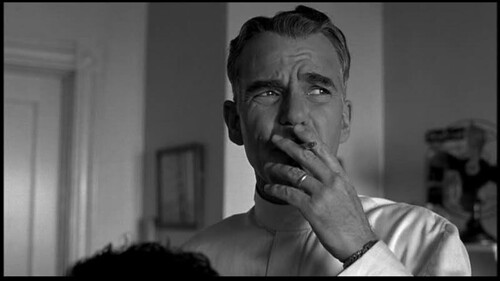
"Me, I don't talk much... I just cut the hair."
Ed Crane is less an Everyman than a Nowhere Man. A cypher, his character owes more to Camus than, say, Cain or Chandler. Yet like the work of the latter, his entire existence, or lack thereof, is laid out before us in the very first scene. As readers, we know of Philip Marlowe's ideals, persona and conviction from the opening pages of every novel he stars in and time and again, these qualities steadfastly refuse to change. The same goes for Ed Crane, although compared to Marlowe, who springs forth fully-formed, Crane has already been and will always remain a specter. We know implicitly in the film's first few minutes that he was born into this. No event altered his outlook or carriage. He has spent his entire life silently watching from the shadows. Observing, rarely judging. He sits quietly by as his brother-in-law tells one long-winded yarn after another. He has known for years of his wife's infidelity though it never really bothers him. Later, he uses this knowledge for nefarious purposes but it is really only a means to an end. He is -- in a word -- unflappable.
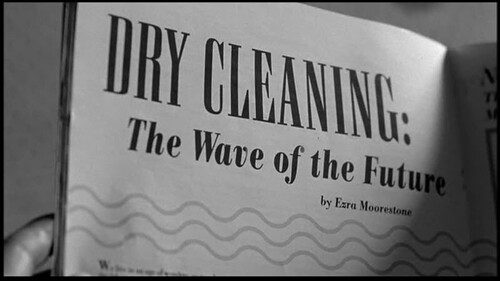 After a life of pure, simple existence, Crane finally decides to take a chance when he meets an entrepreneur looking for backers for a new invention called Dry Cleaning. We never really find out what about the proposal catches Crane's eye and sends his story down the fatalistic Noir path. Is it the money? If so, what does he want it for? This is a man of little ambition. Does he want to get back at his wife's partner in infidelity, her boss at the local department store, whom he eventually extorts? Is he just bored? Regardless, like No Country For Old Men, the money means nothing. It is utterly trivial. What does matter is that this man, this barber, has finally set something in motion that, for better or worse, changes his life and the lives of those around him forever.
After a life of pure, simple existence, Crane finally decides to take a chance when he meets an entrepreneur looking for backers for a new invention called Dry Cleaning. We never really find out what about the proposal catches Crane's eye and sends his story down the fatalistic Noir path. Is it the money? If so, what does he want it for? This is a man of little ambition. Does he want to get back at his wife's partner in infidelity, her boss at the local department store, whom he eventually extorts? Is he just bored? Regardless, like No Country For Old Men, the money means nothing. It is utterly trivial. What does matter is that this man, this barber, has finally set something in motion that, for better or worse, changes his life and the lives of those around him forever.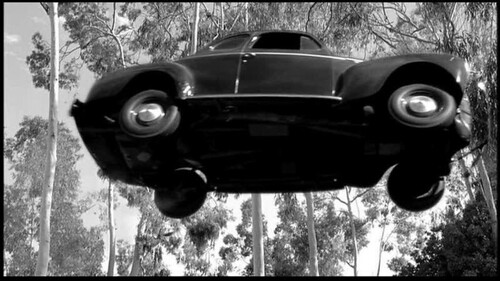 I find Ed Crane's burgeoning passion, regardless of implicit reasons to be the movie's main motive. Though he remains outwardly unreachable through the duration of the film, beneath the surface he becomes excited with possibility. His interest in the dry cleaning scheme and later his not-quite platonic adoption of a teenage pianist are the first pangs of genuine enthusiasm this man has ever known. Of course in true Noir (and Coen) fashion everything quickly goes awry, often in devious ways we never saw coming. Crane ends up killing his wife's lover, who in turn killed the dry cleaning entrepreneur and accidentally impregnated Ed's wife, who herself is jailed for the first murder, who subsequently commits suicide. Eventually, after trying to make things somewhat right, but instead only further ruining the lives of those around him, Crane, too, is jailed for a murder. It just so happens to be the wrong killing but no matter. One could argue that, because of his actions, he's responsible for this one, too.
I find Ed Crane's burgeoning passion, regardless of implicit reasons to be the movie's main motive. Though he remains outwardly unreachable through the duration of the film, beneath the surface he becomes excited with possibility. His interest in the dry cleaning scheme and later his not-quite platonic adoption of a teenage pianist are the first pangs of genuine enthusiasm this man has ever known. Of course in true Noir (and Coen) fashion everything quickly goes awry, often in devious ways we never saw coming. Crane ends up killing his wife's lover, who in turn killed the dry cleaning entrepreneur and accidentally impregnated Ed's wife, who herself is jailed for the first murder, who subsequently commits suicide. Eventually, after trying to make things somewhat right, but instead only further ruining the lives of those around him, Crane, too, is jailed for a murder. It just so happens to be the wrong killing but no matter. One could argue that, because of his actions, he's responsible for this one, too.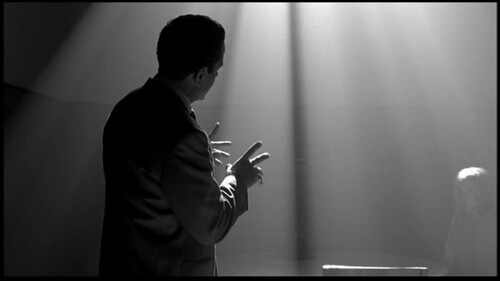
"The more you look, the less you really know."
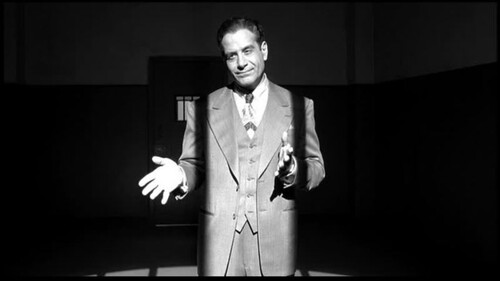
In the final scene, The Barber delivers the last paragraph of his manuscript while observing the haircuts of the men who have sentenced him to die. He does this from the electric chair as casually as he did in a waiting room earlier in the film. This final moment shares with it the calm literary coda that punctuates No Country's muted finale. In the latter, Tommy Lee Jones' retired, world-weary Sheriff tells his wife of his dreams. They involve his father and how he is ready to meet him, how he has accepted death. The Barber, too, is ready and willing to go, but his final words delve a little deeper as we watch this man, who was there all along in flesh, finally leave us. He talks of meeting his wife in the afterlife. Despite all of the harrowing, horrible things that have happened to the two of them, and besides the fact that they never really knew one another, he can't wait to meet her. He speaks of the words that don't exist here and how he'll find them when he gets there.
And then the switch is pulled and we too are gone, obliterated by pure white light. The final chapter break in our messy little story that just hasn't been published yet.
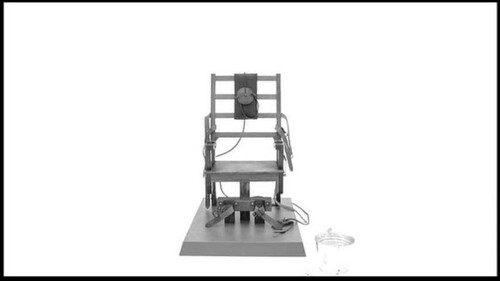




Thanks for this. I haven't seen enough people make the comparison between No Country and TMWWT. To me, they're much closer than the knee-jerk Blood Simple comparisons I've read.
ReplyDeletewow!!!
ReplyDeleteThe man who was not there is really amazing!!!! this recent film. It catch my attention because I really like the film when are similar to a book. This because I can do some review.
ReplyDelete